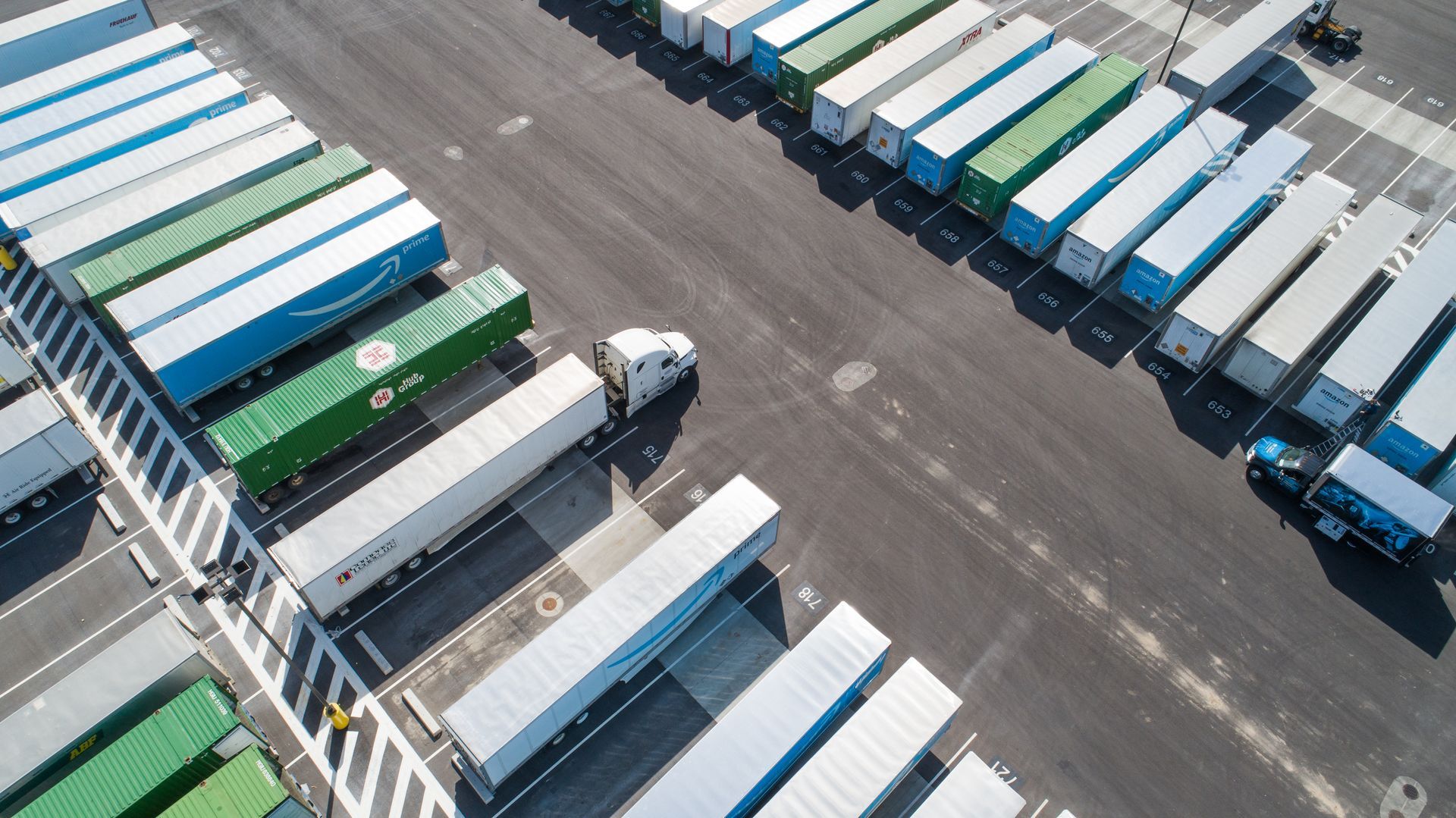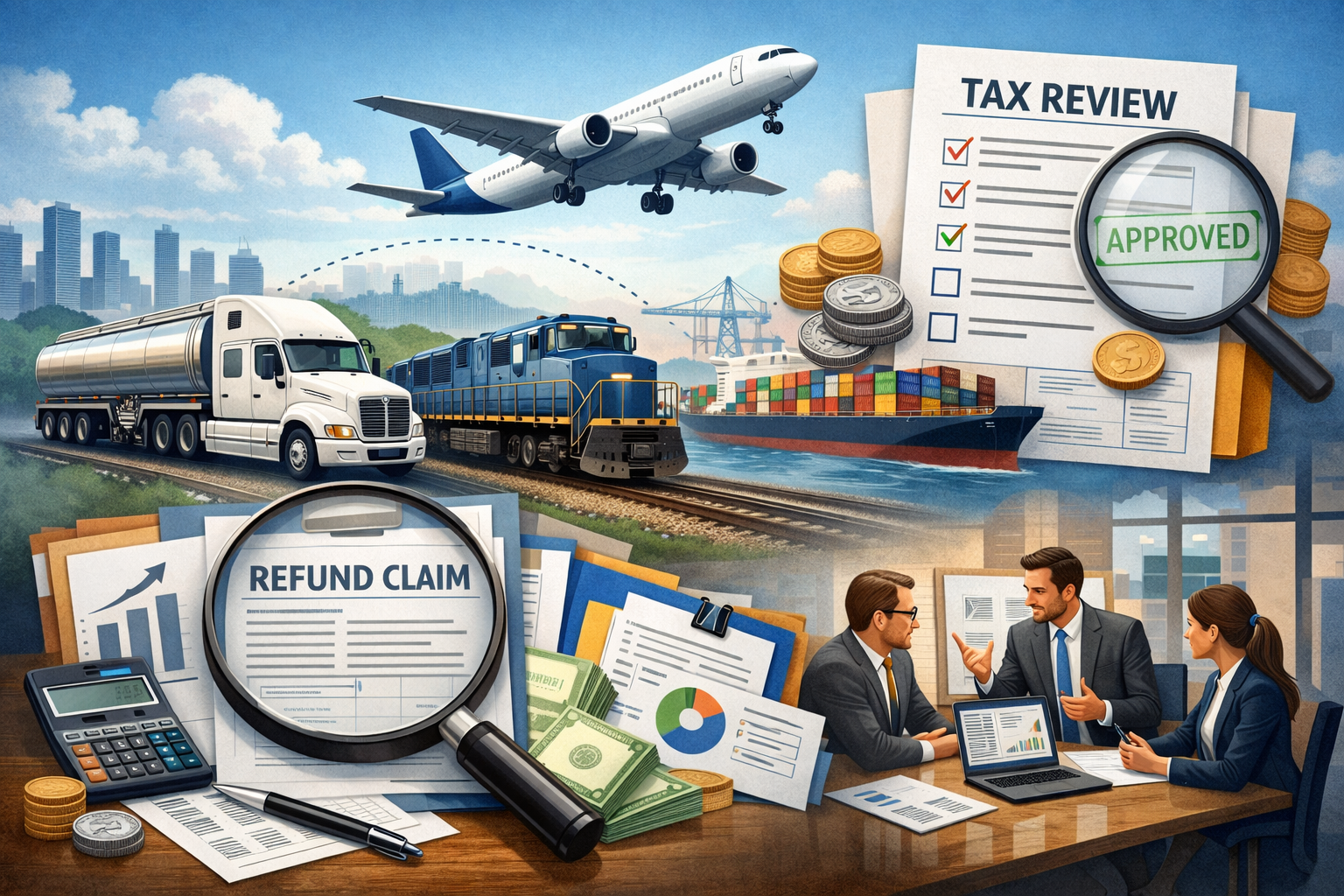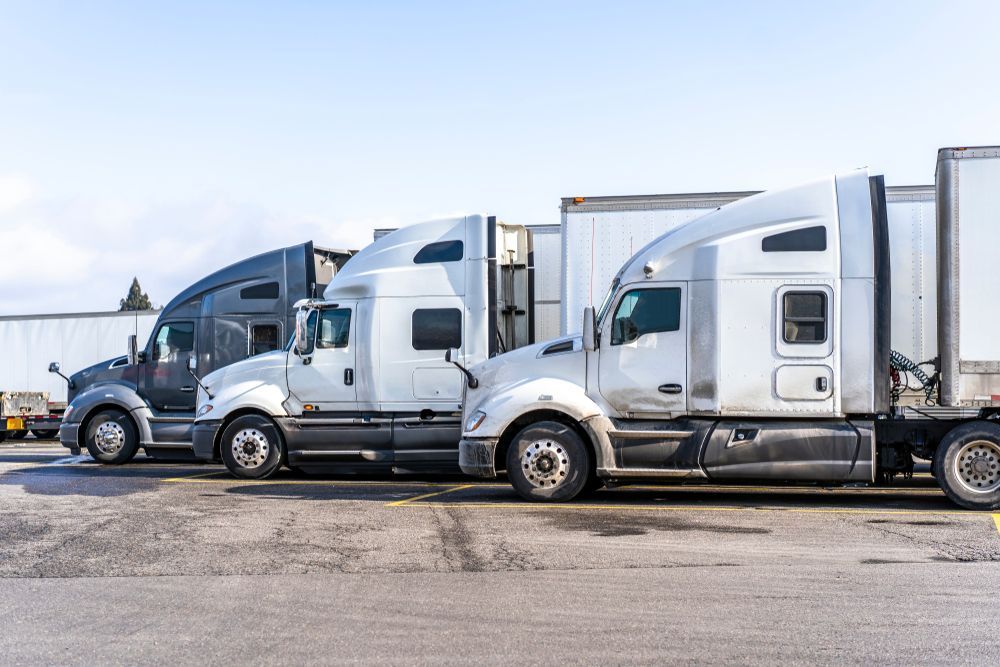Tax Services for Trucking Equipment — An Excise and Sales Tax Guide
Share this Article:

Trucking companies live at the intersection of complex tax systems: federal excise taxes on heavy highway vehicles and tires, state and local sales/use taxes on equipment and parts, fuel and road taxes, and a thicket of fees and surcharges. This guide focuses on two of the most commonly confused areas when buying, leasing, or maintaining equipment: federal excise tax (FET) and state/local sales and use tax. The goal is to help carriers, private fleets, and owner-operators recognize where tax applies, where exemptions may exist, and how to structure clean, audit-ready transactions.
What Counts as “Trucking Equipment”?
When tax rules talk about trucking equipment, they usually include:
- Power units: over-the-road tractors, straight trucks, gliders, day cabs, sleeper cabs.
- Trailers: dry vans, reefers, flatbeds, lowboys, tanks, dumps, chassis/intermodal, specialized units.
- Bodies and upfits: dumps, boxes, mixers, cranes, liftgates, refrigeration units, PTOs.
- Components and attachments: fifth wheels, APUs, telematics, collision-avoidance systems, tarps, hitches.
- Consumables and parts: engines, transmissions, tires, brakes, DEF systems, electronics.
Why it matters: different taxes use different definitions. For instance, federal excise tax targets certain heavy highway vehicles and related bodies/parts. State sales tax rules usually tax tangible personal property unless a specific exemption applies, and they may treat titled vehicles and trailers differently from other equipment.
Federal Excise Tax (FET) on Heavy Highway Vehicles
What it is: A federal tax—commonly 12%—on the first retail sale of certain heavy trucks, tractors, trailers, and truck bodies intended for highway use. It can also apply to lease transactions (treated like sales in many contexts) and to certain installations or conversions.
Big ideas to know (plain-English):
- Scope: New sales of most heavy highway tractors and many trailers are potentially in scope; certain bodies installed on a truck can also be taxable.
- When “repairs” look like “manufacturing”: Significant rebuilds, glider installations, or conversions can trigger FET even if you think you’re only “repairing.”
- Price you pay vs. price that’s taxed: FET is generally computed on the price of the taxable article, including charges for accessories and installations made within a short period of the sale (often referred to as the “6-month rule” in industry practice).
- Exemptions exist: Examples include sales for resale, exports, certain public uses, and items not intended for highway transportation (mobile machinery). But each exemption has tight definitions and documentation requirements.
- Tires: There is a separate federal excise tax on certain heavy truck tires, typically based on weight rating. This is distinct from the 12% heavy vehicle FET.
Practical advice:
- Get the seller’s FET position in writing. If a dealer says “no FET on this unit,” ask why and keep the documentation.
- Coordinate timing of add-ons. Accessories or bodies installed around the time of purchase may be included in the FET base price. If you plan staged installations, understand how timing affects tax.
- Beware of “cheap” sale prices. If the price looks artificially low compared to fair market value while other charges are loaded elsewhere, tax law can recompute a taxable price.
- Keep build sheets and invoices. If an audit shows a major rebuild or conversion, you will need records to support why FET did—or did not—apply.
Sales and Use Tax Basics for Equipment and Parts
Sales tax generally applies to retail purchases delivered in a state. Use tax applies when you buy out of state (or without tax charged) but use, store, or consume the item in a taxing state. Key points for trucking:
- Titled vehicles and trailers: Some states collect tax through motor vehicle or county titling offices; others treat trailers like equipment and tax them through standard sales tax channels.
- Leases vs. purchases: States vary—some tax the full selling price upfront; others tax each rental payment. TRAC leases and finance leases can be treated differently.
- Parts and maintenance: Parts are usually taxable; labor can be taxable or exempt depending on the state and whether the work is repair/maintenance versus manufacturing or installation. Extended warranties and service contracts are state-specific.
- Freight/fees: Delivery charges, doc fees, and shop supplies are taxable in many states if they are part of getting the item to you or into working order.
- Use tax catches “tax-free” deals. Buying in a low-tax state doesn’t immunize you. If you bring the unit home and title or predominantly use it in your state, use tax often applies (with credit for legally paid tax elsewhere).
Common Exemptions and How to Use Them (Carefully)
- Resale/Dealer Exemption
If you are buying to resell or lease (for example, a related leasing company that will rent equipment to the carrier), you may use a resale certificate. This shifts tax to the end user. Misuse of resale certificates is a top audit issue—use them only if you truly resell or lease. - Rolling Stock / Interstate Carrier Exemptions
Several states offer reduced rates or exemptions for motor carriers operating predominantly in interstate commerce. The tests differ—some require a minimum percentage of interstate miles or loads; others require common/contract carrier authority. Documentation usually includes mileage logs, bills of lading, and proof of interstate operations. Expect close scrutiny; rules change frequently. - Occasional/Casual Sale
Purchases from private parties can be exempt in some states, but many jurisdictions exclude motor vehicles and trailers from the casual-sale exemption or collect tax at titling. Always check the vehicle/trailer rules separately from general equipment rules. - Trade-In Credits
Many states allow you to reduce the taxable price by the value of a qualifying trade-in. The credit may be limited to “like-kind” property (e.g., a trailer for a trailer). Keep appraisals and trade-in paperwork. - Manufacturing or Agricultural Exemptions
Carriers sometimes try to apply “manufacturing” or “processing” exemptions to their shops. These rarely apply to standard repair/maintenance of rolling stock. Don’t rely on these without a state-specific ruling. - Direct Pay Permits
Larger fleets can obtain a permit to self-assess tax directly to the state. This can simplify purchasing across states and avoid vendor over- or under-collection, but it increases your compliance responsibility.
Tires, Cores, and Environmental Fees
- FET on heavy truck tires is separate from heavy vehicle FET. Tire dealers often handle collection/remittance, but audit adjustments still fall back on records.
- Waste tire fees, battery fees, and core charges are state-specific. Most are taxable; some aren’t. Make sure your AP system codes these consistently.
Cross-Border Operations: Sourcing and Credits
- Sourcing: Sales tax generally follows the place of delivery or titling, but states have special rules for vehicles and trailers. If a tractor is delivered and titled in State A, then quickly used in State B, State B may still assess use tax on a portion or all of the price.
- Credit mechanisms: Most states grant a credit for tax legally paid to another state on the same item. The credit is limited to the amount of tax that state would have charged, and documentation is essential.
- IRP/IFTA is not sales/use tax. Apportionment under IRP and fuel tax reporting under IFTA do not replace sales or use tax obligations.
Nexus for Carriers
You can owe sales/use tax in a state even without a terminal there. Nexus can be created by:
- Having drivers or agents regularly present.
- Owning or leasing property (trailers parked at a customer yard, drop lots).
- Delivering and installing equipment in the state (for shop operations).
Nexus analysis affects your obligation to collect tax from customers (if you sell or lease equipment/parts) and your obligation to self-assess use tax on your own purchases.
Documentation: Your Best Audit Defense
For equipment transactions, auditors expect a clean file. At a minimum, organize:
- Bill of sale or lease agreement with make/model/VIN, delivered location, and price allocation.
- FET statement from the seller (tax charged, not charged, and why).
- Title and registration papers matching the state tax treatment.
- Exemption certificates (resale, rolling stock, government, export), fully completed and timely.
- Interstate evidence for rolling stock exemptions (mileage reports, bills of lading).
- Invoices and build sheets for bodies, upfits, and accessories, with dates (for FET and sales tax sourcing).
- Proof of tax paid in another state if you are taking a credit.
- Shop records showing parts vs. labor lines and descriptions.
A neat audit file often shortens examinations and reduces assessments.
Frequent Pitfalls (and How to Avoid Them)
- “We bought it in a tax-free state.”
Use tax back home is still likely. Plan for it and document credits. - Mislabeling rebuilds as repairs.
If the scope of work is significant, you can trigger FET. Review major rebuilds with your tax advisor before cutting the PO. - Relying on an old rolling stock exemption.
States revise rules. What was exempt last year may now require a new certificate or a higher interstate threshold. - Ignoring leases and buyouts.
Some states tax each rental; some tax the upfront “selling price.” Lease buyouts can be taxed differently from the stream of rent you already paid. Structure with tax in mind. - Bad AP coding.
Freight, doc fees, shop supplies, environmental fees—your system needs rules for when these are taxable. A few wrong defaults can add up across hundreds of invoices. - Assuming dealer paperwork is always right.
Dealers are helpful, but they do not control your use, title, or tax nexus. Validate the dealer’s tax treatment against your facts. - Missing trade-in credits.
If your state allows them, make sure the paperwork is complete and values are clearly assigned.
Planning Strategies That Actually Help
- Front-load the tax conversation. When negotiating price, also negotiate who bears FET, what’s in the taxable base, and which state will source the sale.
- Stage installations deliberately. If you’re adding expensive bodies or refrigeration units, consider delivery timing and where work is performed.
- Consider a leasing entity. Some fleets place equipment in a related lessor that rents to the carrier. This can centralize exemption certificates and use tax accruals and may unlock resale/lease exemptions where appropriate. Get legal and tax advice before restructuring.
- Use direct pay (where eligible). It reduces vendor errors and gives you control over multi-state accruals.
- Standardize your exemption packet. A single folder that includes resale certificates, rolling stock affidavits, authority letters, and a point of contact for verification saves time.
- Run periodic reverse audits. Review the last 24–36 months for over-paid tax on exempt transactions and for under-accruals. Corrections before an audit are cheaper.
How a Professional Tax Services Engagement Works (Trucking-Focused)
A well-run engagement typically follows this path:
- Scoping call to confirm what you buy (power units, trailers, shop parts), where you operate, and how you title/register.
- Data pull: vendor master, 12–36 months of AP detail, lease schedules, equipment master, and key contracts.
- Rate and rule map: build a state-by-state profile for titled vehicles, trailers, parts, labor, and common fees; confirm rolling stock or other exemptions.
- Methodology: for equipment, analyze FET exposure and state sourcing; for parts and maintenance, recalculation can be performed using an agreed rate table and your company’s exemption logic.
- Findings: a schedule of tax refunds to recover (over-collections) and exposures to accrue (under-collections), with documentation packs.
- Implementation: vendor letter templates, corrected exemption certificates, and AP coding rules.
- Defensibility: create an audit file with statutes/rulings, certificates, and transaction-level workpapers.
- Training: short sessions for purchasing, fleet, and AP teams so the fixes stick.
Quick Reference Checklists
Pre-Purchase (Power Unit/Trailer):
- Where will we take delivery and title?
- Is FET being charged? If not, why not—document it.
- Are we claiming a rolling stock exemption? Get the state’s current form and fill it out now.
- Do we have a trade-in? Will it qualify for a credit?
- Are we staging bodies/upfits? Confirm effect on FET and sales tax.
- Who pays freight, PDI, doc fees—and are they taxable?
Shop/Parts Purchasing:
- Parts taxable? Labor taxable? If mixed, are lines separately stated?
- Environmental fees and shop supplies—taxable or not under your state’s rule?
- Are we using a direct pay permit? If so, has the vendor stopped charging tax?
- Do we have current resale or exemption certificates on file for vendors who need them?
Leases:
- Is this a true lease or financing? How does the state tax each rent vs. upfront?
- If there’s a buyout, how will the state tax that payment?
- Who handles FET on a lease? Clarify in the contract.
FAQs
Does having interstate authority automatically qualify me for rolling stock exemptions?
No. Many states require proof of predominant interstate use (often a percentage threshold) and sometimes specific carrier status. Keep logs and bills of lading.
If a dealer doesn’t charge me tax, I’m clear, right?
Not necessarily. If tax was due, the state can assess
use tax against you later—plus penalties and interest.
We operate in many states. Is there an easy way to get “one exemption to rule them all”?
Unfortunately, no. You need the
right certificate for each state and transaction type (resale, rolling stock, government, etc.).
Do IRP and IFTA filings help my sales/use tax situation?
They don’t replace sales/use tax, but
mile and jurisdiction data can help prove interstate use for exemptions and allocations.
Can we recover over-paid tax on past purchases?
Often yes, subject to each state’s
statute of limitations (commonly 3–4 years) and the availability of documentation.
The Bottom Line
The taxes surrounding trucking equipment aren’t intuitive. Federal excise tax has its own vocabulary and triggers. State and local sales/use taxes vary widely on vehicles, trailers, leases, parts, and labor. Two companies buying the same tractor/trailer package can face different outcomes simply based on where delivery occurs, how the deal is structured, and which exemptions are supported by the records.
The smartest approach is process-driven:
- Decide your tax position before you sign.
- Lock down documentation the day of the transaction.
- Keep AP coding consistent and review it quarterly.
- Use professionals to map multi-state rules, scrub historical purchases, and set you up with clean exemption management and audit files.
Doing this well lowers your all-in cost of capital on equipment, reduces audit risk, and avoids nasty surprises when cash is tight.
Transportation Tax Consulting is here to help!
Share with Us:




